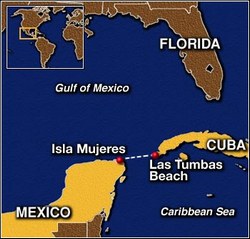Cuba Standard Exclusive: Oil group gets license for Cuba trip
- Submitted by: admin
- United States
- Business and Economy
- Politics and Government
- 05 / 16 / 2010

The International Association of Drilling Contractors received a travel license from the U.S. Department of Treasury Wednesday, allowing the Houston-based group to send a delegation to Cuba within three months, Tampa attorney Al Fox told Cuba Standard.
This marks the first time a U.S. oil industry delegation will visit the island,another stepping-stone event in the gradually rising and increasingly public opposition of the industry to the U.S. embargo.
“It’s now up to the Cubans to find time for us,” says Brian Petty,IADC’s executive vice president for government affairs.
“They’ve indicated they wanted us to come, but that was last broached in October.”
Treasury’s Office of Foreign Assets Control rejected IADC’s first license application in December. Al Fox and the group appealed and reapplied in March; OFAC granted the license in the second round.
“I think it was this blowout in the Gulf of Mexico that changed minds in the Obama Administration,” Petty says. “They realized we can’t say ‘no’ to the Cubans.”
The IADC is an international organization, but its headquarters are located in Houston, it is chartered as a U.S. non-profit, the bulk of its members are U.S.companies, and the delegation will consist exclusively of U.S. citizens, Petty says.
The trip comes just as public confidence in deepwater drilling is at a low point, after the April 22 Deepwater Horizon spill on the U.S. side of the Gulf of Mexico.
But the association is fielding the disaster as an argument in favor of allowing Cuba access to U.S. technology and techniques.
In a white paper arguing the need to open up Cuba to U.S. oil industry standards, the IADC lays out a horror scenario of a Deepwater Horizon-style blowout without the safety standards, response teams and logistical support for damage control provided by the U.S. oil industry.
“Imagine if none of these resources and know-how had been available,” the IADC white paper issued on May 11 says. “An oil company with no experience in offshore drilling is in charge.
There is no commitment to blowout and spill prevention rocedures and little knowledge of state-of-the-art technologies or access to sophisticated equipment.
Crews have undergone only limited safety training and are unfamiliar with well-control best practices.
The country that has jurisdiction doesn’t even have legislation that would hold the national oil company liable in case of a blowout.
… The truly scary aspect, however, is that this nightmare has the potential to become reality in nearby "waters' offshore Cuba.”
A map in the white paper displaying sea currents shows how a spill in Cuban waters could not only affect Cuban beaches, but the Florida Keys and South Florida as well.
“It’s inevitable that Cuba will explore and exploit their offshore hydrocarbon resources, and it would benefit both the American public and the Cuban people to make sure it is done right,” the paper concludes.
“It is in our national interest to have a constructive, educational and informational exchange with Cuba, and the time to do it is now.”
According to a Reuters report last week, Spanish oil company Repsol YPF SA contracted an exploratory deepwater rig from a subsidiary of Italy’s Eni SpA.
The rig is being built in China, according to Reuters. Repsol, which leads an offshore consortium in Cuba, has been trying to obtain a rig for drilling in Cuban waters since 2004; the delay has been attributed to obstacles created by the U.S. embargo.
The U.S. oil services industry is considered the global standard-setter.
According to Fox, who has been chipping away at the embargo from behind the scenes in Washington by engaging oil industry and other groups, the Cuban government had been seeking U.S. participation in offshore drilling as far back as five years ago.
In 2005, the Cubans, in what Fox calls “an amazing concession,” said they were willing to operate joint ventures under U.S. standards and had requested a seminar introducing Cuban industry officials to U.S. state-of-the-art techniques and regulations. Back then, the IADC chose not to go.
The group has yet to figure out details of the trip. “The intent [is] to take a delegation of technical experts to engage Cuban offshore regulatory authorities in a dialogue on offshore safety,” the IADC white paper says.
“The mission is to protect the U.S. coastline.” The IADC would like to make Cuban authorities “aware of global standards and best practices regarding accident and blowout prevention, environmental mitigation and protection, safety procedures,
hurricane preparation and personnel training,” according to the white paper. Fox says he expects the trip to last three days.
Treasury’s Office of Foreign Assets Control denied the IADC’s initial application in March. OFAC granted the travel license some 40 days after the group appealed.
Fox is also the founder of the Alliance for Responsible Cuba Policy Foundation,and of an anti-embargo PAC. Among others, he was involved in behind-the-scenes work to resolve the Elián González affair.
On Wednesday, the Fort Myers (Florida) News Press reported that Cuban officials contacted experts at Texas A&M University’s Harte Institute for Gulf of Mexico Studies, asking for advice.
Source: http://www.cubastandard.com/?cat=9
Comments